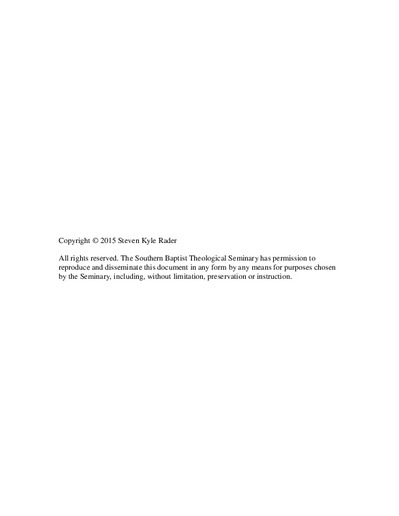The Meaning of Foreknowledge in Romans 8:29 and Its Ecclesiastical Implications
Subject
Bible. Romans, VIII, 29Predestination--Biblical teaching
Election (Theology)--Biblical teaching
Calvinism
Arminianism
Abstract
ABSTRACT
THE MEANING OF FOREKNOWLEDGE IN ROMANS 8:29
AND ITS ECCLESIASTICAL IMPLICATIONS
Steven Kyle Rader, D.Min.
The Southern Baptist Theological Seminary, 2015
Faculty Supervisor: Dr. William F. Cook, III
This thesis examines the relationship between foreknowledge and election in Romans 8:29 and its implications for the church. Chapter 1 gives a brief historical sketch of the controversy over free will, outlining theology's three major historical peaks: Augustinianism and Pelagianism, Semi-Pelagianism, and Calvinism and Arminianism.
Chapter 2 presents foreknowledge as foreseen faith. According to Arminianism, God's foreknowledge in Romans 8:29 refers to his foresight of those men and women who throughout time would come to believe in his Son, thus resulting in their election.
Chapter 3 mirrors chapter two in structure and content but from the Calvinist perspective. Foreknowledge does not mean foresight of faith; instead, it refers to God's covenantal commitment to individuals he set his love upon before the creation of the world.
Chapter 4 defends the Hebraic understanding of foreknew by giving five lines of argument for defining ðñïÝãíù as "foreloved." The five arguments are (1) Defining foreknowledge as foreseen faith requires that the concept of prevenient grace be true, which is an idea not substantiated from Scripture. (2) Foreseen faith is foreign to the text of Romans 8:29. (3) The verb ãéíþóêù, from which "foreknew" is derived, often connotes love, affection, and relationship. (4) The terms "foreknowledge" and "predestination" are not synonymous. (5) Since justification is by faith, and only those who are called are justified, it must be that God's calling produces faith.
Chapter 5 contends that the Calvinistic view of foreknowledge makes a significant difference in the practical outworking of life and faith over and above the Arminian view. It addresses three areas of ecclesiastical life: personal assurance, evangelism, and pastoral ministry.

